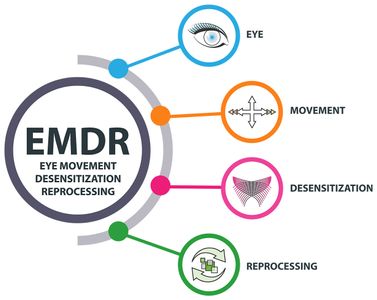Recognizing the Top Signs You Need an EMDR Therapist
 Syed Zurnain Abbas
23 Jul, 2025
9 mins read
23
Syed Zurnain Abbas
23 Jul, 2025
9 mins read
23

Unresolved trauma can quietly impact your mental and emotional well-being, even years after the initial event. If you’re struggling with persistent anxiety, negative self-beliefs, or intrusive memories, you might benefit from trauma-focused therapy—particularly Eye Movement Desensitization and Reprocessing (EMDR). But how do you know when it's time to seek help?
In this guide, we’ll explore the top signs you may need an EMDR Therapist and explain how this powerful form of therapy can help rewire your brain’s response to traumatic experiences.
Understanding EMDR Therapy and Its Benefits
EMDR therapy is a highly structured, evidence-based technique designed to help individuals process and release trauma. Unlike traditional talk therapy, EMDR uses bilateral stimulation—typically in the form of eye movements—to activate both hemispheres of the brain while recalling distressing memories.
The goal is to reduce the emotional intensity of these memories and replace negative beliefs with empowering ones. EMDR therapy has shown positive outcomes in treating a wide range of trauma-related conditions, including PTSD, anxiety, panic disorders, and emotional abuse.
Now, let’s dive into the most common signs that indicate it’s time to consider working with a trauma-informed, certified EMDR practitioner.
1. Recurring Flashbacks or Nightmares
One of the clearest signs that you may benefit from EMDR therapy is experiencing frequent flashbacks, intrusive memories, or nightmares. These involuntary symptoms are often linked to unprocessed trauma stored in your nervous system. EMDR therapy helps reduce the emotional intensity of these events, making them feel like distant memories rather than present-day experiences.
2. Feeling Stuck Despite Years of Talk Therapy
Have you spent years in therapy, but still feel emotionally stuck? EMDR may offer the breakthrough you need. Many individuals turn to EMDR when they realize that traditional talk therapy hasn't helped them fully process or let go of past trauma. EMDR therapy targets the root cause instead of just the symptoms, allowing for deep and lasting emotional transformation.
3. Avoidance of People, Places, or Conversations
Do you go out of your way to avoid certain triggers, even if they seem harmless to others? Avoidance is a common trauma response. Whether it's avoiding crowded places, certain people, or talking about specific topics, this behavior may be your brain’s way of trying to shield you from emotional pain. A certified EMDR therapist can help you face and reprocess those triggers safely and gradually.
4. Persistent Negative Self-Beliefs
Many trauma survivors struggle with deeply ingrained negative self-perceptions such as “I’m not good enough,†“I don’t matter,†or “I’m unlovable.†These limiting beliefs often stem from past experiences and can fuel anxiety, depression, and self-sabotaging behaviors. EMDR therapy works to identify and replace these harmful beliefs with positive, affirming thoughts.
5. Hypervigilance and Chronic Anxiety
If you constantly feel on edge, easily startled, or hyper-aware of your surroundings, it could be a sign of unresolved trauma. These symptoms can make daily functioning difficult and drain your energy. EMDR therapy helps calm your nervous system and shift you out of fight-or-flight mode, allowing you to feel safer in your body and environment.
6. Difficulty Trusting Others or Maintaining Relationships
Trauma—especially interpersonal trauma—can impact your ability to trust others, communicate effectively, or feel secure in relationships. EMDR helps untangle those old patterns and emotional wounds that interfere with your connection to others. Many people report improved emotional intimacy and relationship stability after undergoing EMDR therapy.
7. Physical Symptoms Without a Medical Explanation
Unresolved trauma doesn’t just live in your mind; it can manifest physically too. Chronic pain, gastrointestinal issues, fatigue, and unexplained aches are often linked to emotional trauma. EMDR helps address the psychological root causes that may be contributing to these ongoing physical symptoms.
8. Emotional Numbness or Disconnection
Do you feel emotionally flat, detached, or disconnected from others and yourself? Emotional numbness is a trauma response that protects you from overwhelming feelings—but it also cuts you off from joy, connection, and purpose. EMDR therapy can help you safely reconnect with your emotions and regain a fuller experience of life.
Long-Term Benefits of EMDR Therapy
Choosing to work with an experienced EMDR therapist offers numerous long-term mental health benefits:
- Lasting reduction in trauma-related symptoms
- Improved emotional regulation and coping strategies
- Increased sense of safety and confidence
- Better sleep and decreased anxiety levels
- Healthier relationships and self-worth
How to Prepare for EMDR Therapy
If you’ve identified with several of the signs above, it may be time to explore EMDR therapy. Here are a few steps to take:
- Find a certified EMDR therapist trained and licensed through EMDRIA or another reputable organization.
- Schedule an initial consultation to discuss your symptoms, goals, and readiness for trauma reprocessing.
- Practice grounding exercises such as deep breathing, progressive muscle relaxation, or visualization techniques to build emotional resilience.
- Stay open to the process—EMDR can feel unfamiliar at first, but its results are often life-changing.
FAQs About EMDR Therapy
Q: Is EMDR only for people with PTSD?
No. EMDR therapy can be effective for anyone who has experienced trauma, emotional abuse, grief, anxiety, or low self-esteem—even if they don't meet the clinical criteria for PTSD.
Q: How quickly can I expect results from EMDR therapy?
While some people notice a difference after a few sessions, others may require several months. Progress depends on the complexity of the trauma and how well your body responds to reprocessing.
Q: Will I have to talk about my trauma in detail?
Not necessarily. One of the unique aspects of EMDR is that you don’t need to relive or verbalize every detail of the trauma for the therapy to be effective.
Q: Can EMDR be combined with other forms of therapy?
Yes. EMDR can complement other approaches such as cognitive-behavioral therapy (CBT), mindfulness practices, and somatic therapies.
Q: Is EMDR safe for children or teens?
Yes, EMDR is safe for children and adolescents when facilitated by a therapist who is trained to work with younger populations.
Final Thoughts
Recognizing the signs that you need an EMDR therapist is the first step toward healing deep emotional wounds. Whether you’re battling intrusive memories, chronic anxiety, or persistent negative self-beliefs, EMDR therapy can offer powerful relief and transformation.
Working with a certified EMDR therapist ensures that you’ll receive trauma-informed care tailored to your unique experiences. If you're ready to step out of survival mode and into a life of emotional balance and peace, now may be the time to begin your EMDR journey.
Written By:
Syed Zurnain Abbas



Hotels at your convenience
Now choose your stay according to your preference. From finding a place for your dream destination or a mere weekend getaway to business accommodations or brief stay, we have got you covered. Explore hotels as per your mood.





